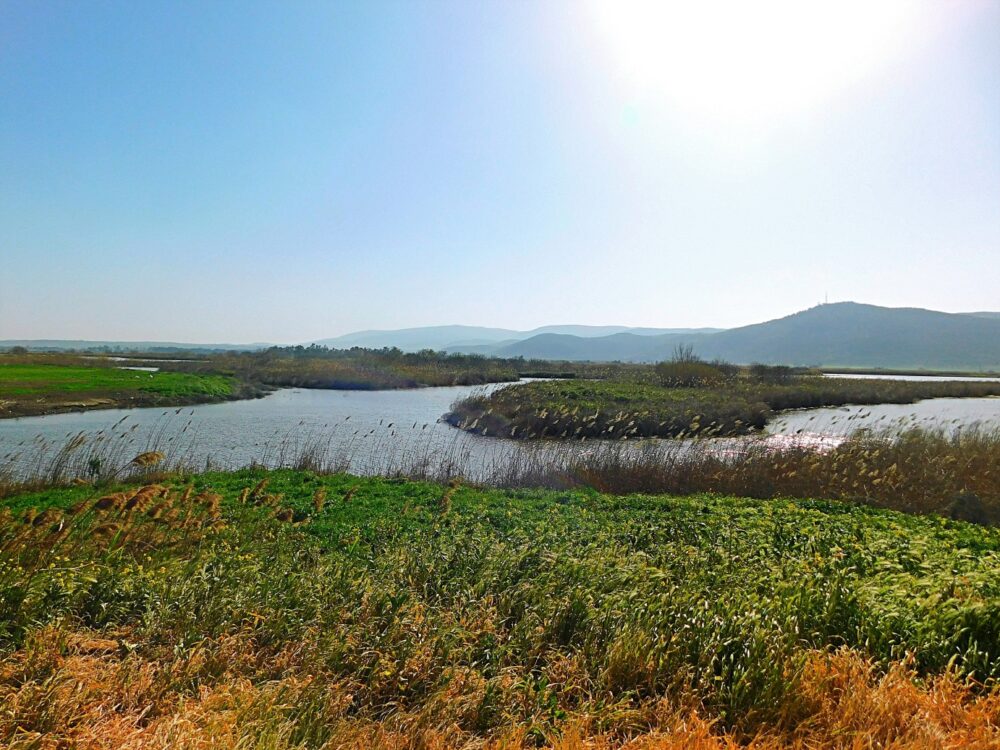#TomorrowIsSunday (EN + ES) | How to hear Jesus?


The Hula Valley, PhotoCredit_Sr. Amata CSFN
Fourth Sunday of Easter, Year C
Sunday, May 8, 2022
Gospel of John 10: 27-30
EN https://bible.usccb.org/bible/readings/050822.cfm
You can download the commentary on the Gospel and beautiful photos:
https://www.academia.edu/78674735/How_does_Jesus_speak_today?source=swp_share
*
IV Domingo de Pascua, Año C
Domingo, 8 de mayo del 2022
Evangelio de Juan 10,27-30
ES https://bible.usccb.org/es/bible/lecturas/050822.cfm
1 How to hear Jesus?
The Gospel talks about listening to the voice of Jesus. But we often wonder how Jesus speaks in our days. Apparently, He speaks every day and in many ways. Let’s look at four main ways God speaks to us.
2 Key Words
My sheep hear my voice, I know them.
The Bible is the first and most important channel of communication between God and a person because it was written under the inspiration of the Holy Spirit. After reading the Scriptures in church, the author’s signature is given: This is the Word of God.
Jesus founded the Church to proclaim the good news and to continue His mission on earth. Thus, the second source of knowing the voice of Jesus is the magisterium, or teaching of the Church. It helps us to evaluate often complicated situations because it analyzes them in the light of Scripture and the centuries-old tradition of the Church.
The Lord Jesus also speaks through private revelations that are approved by the Church. Although they are not necessary for salvation, they can contribute much to our lives. An example of this is the Diary of St. Sister Faustina, in which she recorded her dialogues with Jesus. It is available in its entirety on the internet at: https://www.saint-faustina.org/diary-full-text/
As God used to speak through prophets, now He speaks through other people. And these can often be people close to us, friends or strangers. It is just a matter of discerning the voices that come to us.
3 Today
“Faith is born of listening,” says St. Paul. This is the key to a happy life, because God wants us to be happy. So how do I listen to Jesus?

Spring sheepherding in the desert of the Jordan Valley, PhotoCredit_Sr. Amata CSFN
*
1 ¿Cómo escuchar a Jesús?
El Evangelio habla de escuchar la voz de Jesús. Sin embargo, a menudo nos preguntamos cómo habla Jesús en nuestro tiempo.
Resulta que Él habla todos los días y de muchas maneras. Veamos las cuatro formas principales en que Dios nos habla.
2 Palabras clave
«Mis ovejas escuchan mi voz; yo las conozco… »
La Biblia es el primer y más importante lugar de comunicación de Dios con el hombre, porque fue escrita bajo la inspiración del Espíritu Santo. Después de leer la Escritura Sagrada en la iglesia, se da la firma del autor: Esta es la Palabra de Dios. Jesús fundó la Iglesia para anunciar las buenas nuevas y continuar su misión en la tierra. De ahí que la segunda fuente para conocer la voz de Jesús sea el magisterio, la enseñanza de la Iglesia. Nos ayuda a evaluar situaciones a menudo complejas, porque las analiza a la luz de la Sagrada Escritura y de la tradición secular de la Iglesia.
El Señor Jesús ta mbién habla a través de revelaciones privadas, que son aprobadas por la Iglesia. Aunque no son necesarios para la salvación, pueden aportar mucho a nuestra vida.Un ejemplo de ello es el Diario de sor Santa Faustina, en el que registró sus diálogos con
Jesús. Está disponible en su totalidad en Internet a través de la página web: https://www.saint-faustina.org/diary-full-text/
Al igual que Dios habló a través de los profetas en el pasado, ahora habla a través de otras personas. Y a menudo pueden ser persona s cercanas, conocidas o desconocidas. Sólo es cuestión de discernir las voces que nos llegan.
3 Hoy
« La fe nace de la escucha de la voz del Señor », dice San Pablo. Esta es la clave de una vidafeliz, porque Dios quiere que seamos felices.
¿Cómo puedo escuchar a Jesús?

Corderos, Fotos – Hna. Amata CSFN
You can read also:
#TomorrowIsSunday (EN+ES) | What rebuilds a relationship with Jesus? >>>
#TomorrowIsSunday (EN+ES) | Why is this Sunday Compared to a “Second Baptism”? >>>
#TomorrowIsSunday (EN+ES) | Jesus’ greatest miracle >>>
#TomorrowIsSunday | What does Jesus write in the sand? >>>
#TomorrowIsSunday (EN+ES) | What is the scandal of mercy? >>>
#TomorrowIsSunday (EN+ES) | Why Does Jesus Pray? >>>
#TomorrowIsSunday (EN+ES) | What Should One Do when Tempted? >>>
#TomorrowIsSunday (EN+ES) | What Do a Hypocrite and a Mask Have in Common? >>>
#TomorrowIsSunday (EN+ES) | Why should we love our enemies? >>>
#TomorrowIsSunday (EN+ES) | Jesus’ Counsel Regarding Hatred Prompted by Faith >>>
#TomorrowIsSunday (En+ES) | In the Bible, what does it mean to be “fisher of men”? >>>
#TomorrowIsSunday (EN+ES) | Why is Nazareth a Tragic City? >>>
#TomorrowIsSunday (EN+ES) | Who is Theophilus for whom Luke wrote the Gospel? >>>



Dodaj komentarz